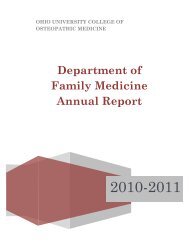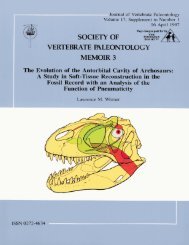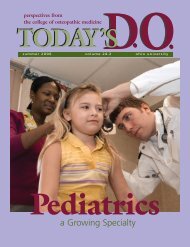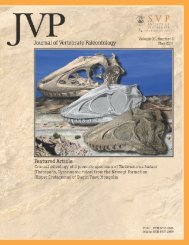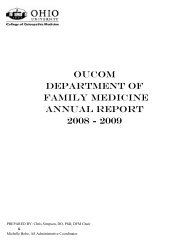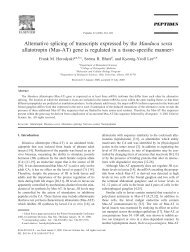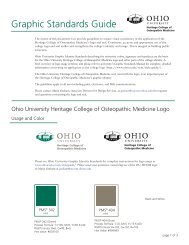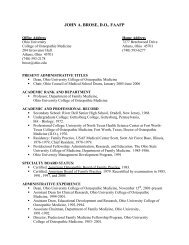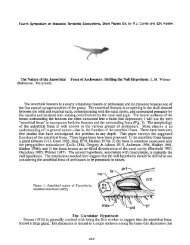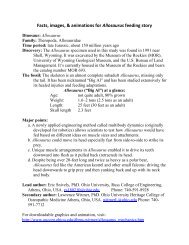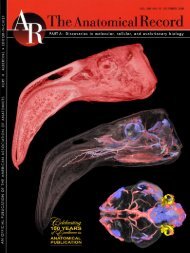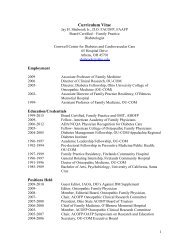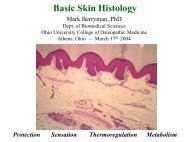DO - Ohio University College of Osteopathic Medicine
DO - Ohio University College of Osteopathic Medicine
DO - Ohio University College of Osteopathic Medicine
You also want an ePaper? Increase the reach of your titles
YUMPU automatically turns print PDFs into web optimized ePapers that Google loves.
Emily’s story<br />
I remember that morning very clearly.<br />
While chastising myself for sleeping in and leaving<br />
only 30 minutes to get ready for work, my cell phone<br />
rang. It was 7 a.m. A few days earlier, Larry told me<br />
that he was leaving for a month-long mission and<br />
would not be able to call me until the end <strong>of</strong> March.<br />
I answered. A male voice identified himself as the<br />
rear detachment <strong>of</strong>ficer for 5-73 CAV and he had news<br />
about Larry. I thought the call might be about some<br />
paperwork that Larry and I needed to fill out. It<br />
never occurred to me that he might have been hurt.<br />
Capt. Larry Robinson with an Iraqi child during a<br />
combined medical engagement mission.<br />
At NNMC I received first-rate medical care, for which I’m<br />
grateful. I wasn’t the most pleasant patient to care for—I<br />
would <strong>of</strong>ten awake from horrible nightmares where I thought<br />
the nurses were all trying to kill me. I was discharged from<br />
NNMC on March 13 to begin my three-month rehabilitation<br />
at Firelands Regional Medical Center.<br />
I did my internship and residency in family practice at Firelands.<br />
My father-in-law, Dr. James Preston, is the director <strong>of</strong> medical<br />
education there and was my first boss during my training.<br />
He’s become a great friend and an inspiration to me.<br />
The medical education I received at Firelands was great. It<br />
gave me everything I needed to be confident <strong>of</strong> my skills<br />
while in Iraq. My focus on hospital and in-patient training at<br />
Firelands—central lines, intubation, chest tubes, etc.—made<br />
procedures and trauma much easier for me in the field.<br />
Almost all soldiers in Iraq suffer from chronic thoracic and<br />
lumbar back pain. It’s one <strong>of</strong> the consequences <strong>of</strong> wearing 50<br />
pounds <strong>of</strong> body armor, spending hours sitting and sleeping in<br />
cramped humvees and sleeping outdoors on the ground while<br />
on missions. Because <strong>of</strong> my excellent OMM training, I was<br />
able to use manipulation to relieve their back pain.<br />
I still have some lingering problems, but I’m rapidly<br />
improving and expected to make a full recovery. After a few<br />
more months <strong>of</strong> rehabilitation, I’ll receive an extensive<br />
cognitive evaluation in the Traumatic Brain Injury Clinic at<br />
Walter Reed Army Hospital to see if I’m ready to return to<br />
active Army duty as a physician.<br />
My squadron has been hit really hard since my injury—I was<br />
the first—18 have been killed and over 40 have been injured<br />
during their long mission in the Diyala River Valley.<br />
I’m not sure if I’ll ever be asked to deploy to Iraq again.<br />
But this brush with death has made me realize that every<br />
day is a gift from God, and it’s important to make the<br />
most <strong>of</strong> every moment.<br />
TODAY’S<br />
<strong>DO</strong><br />
When he told me that Larry had a skull fracture, my<br />
mind went blank. He continued talking, but I couldn’t<br />
comprehend what this guy was saying. I gave the<br />
phone to my dad, hoping he could understand what<br />
was happening.<br />
The look on my father’s face told me the news wasn’t<br />
good—Larry had sustained a skull fracture and they’d<br />
call us when they had more information.<br />
I couldn’t stop crying. After praying and more crying,<br />
I called Larry’s brother, Mark, who is an OU-COM<br />
medical student at Firelands. He and his wife, Valerie,<br />
joined me and my parents for a prayerful wait at the<br />
kitchen table.<br />
We waited for what seemed like an intolerably long<br />
time, then, at 2 p.m., Larry called! His speech was<br />
slurred, but he assured me that his injuries weren’t<br />
“life-threatening,” he was going to be okay and that<br />
he loved me.<br />
I arrived in Bethesda, Md., at the National Naval Medical<br />
Center just a few hours after Larry checked into the<br />
ICU. When I saw him, he had 67 staples holding his<br />
scalp together, two black eyes from the broken bones<br />
in his face and the head trauma, and one blood-red<br />
eyeball. But I couldn’t take my eyes <strong>of</strong>f him—it was so<br />
good to see him.<br />
He’s had an amazing recovery. The doctors at Walter<br />
Reed Army Hospital are impressed with the care he’s<br />
receiving at Firelands and pleased with how well he’s<br />
healing. They expect a full recovery.<br />
We’re so blessed that we can resume our life together.<br />
What a gift.<br />
-Emily Robinson



